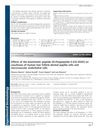Biological Characterization of Cultured Dermal Papilla Cells and Hair Follicle Regeneration In Vitro and In Vivo
January 2006
in “
中华医学杂志:英文版
”
TLDR Cultured skin cells can trigger hair growth and the amount of certain proteins they produce affects their ability to regenerate hair follicles.
This study investigated the role of dermal papilla cells (DPC) in hair follicle growth and regeneration. The researchers examined the expression of certain cytokines in cultured DPC and their effects on DPC behavior. They found that the expression of endothelin-1 (ET-1) and stem cell factor (SCF) in DPC decreased with passage number. When DPC were combined with hair follicle epithelium cells, hair follicle-like structures were formed in organotypic cultures and when implanted into nude mice. The researchers concluded that cultured DPC can induce hair follicle regeneration and sustain hair growth, and that the expression of ET-1 and SCF is correlated with the ability of DPC to induce hair follicle regeneration.







